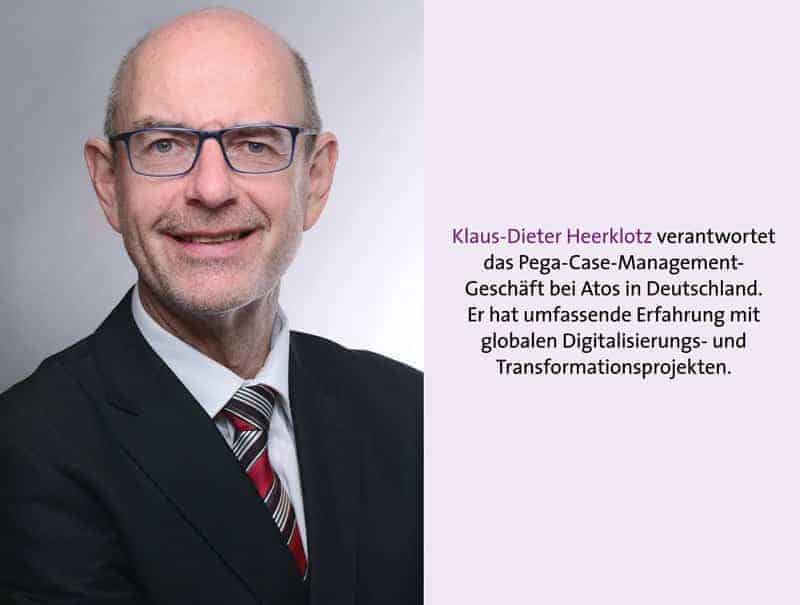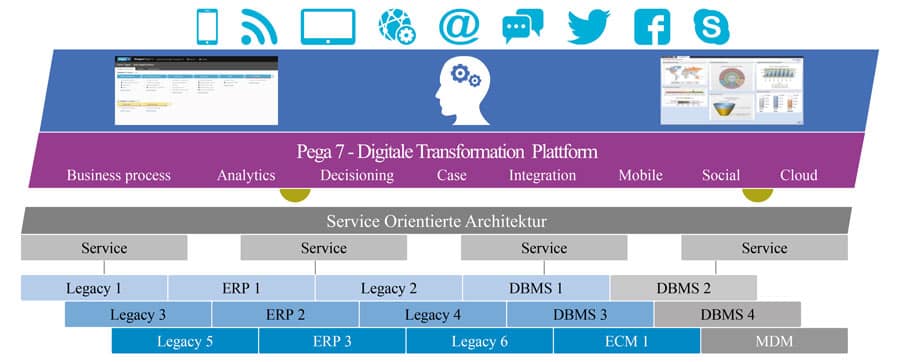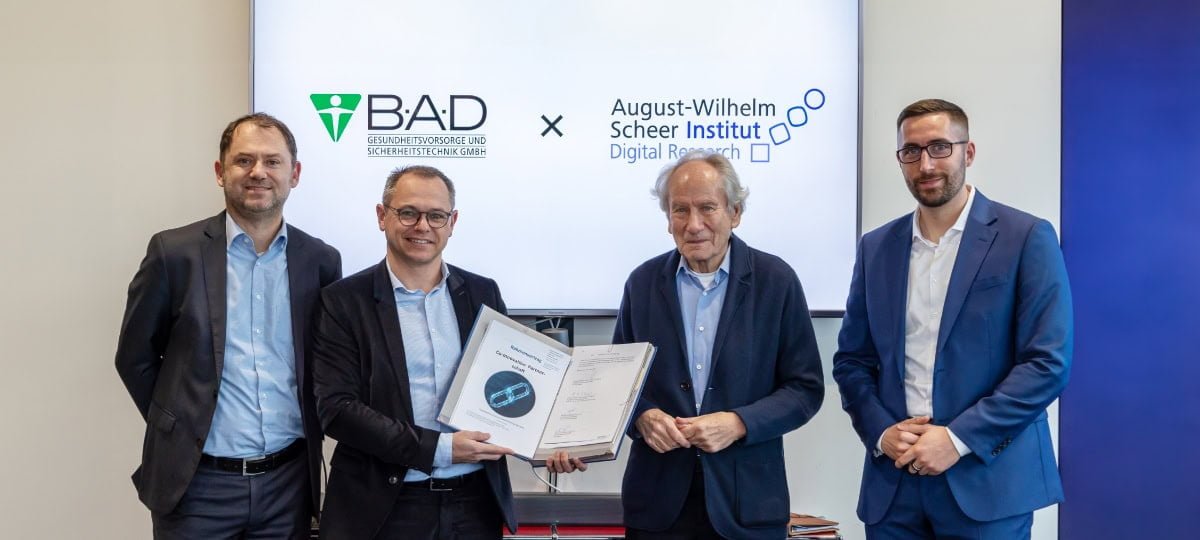Agile business processes despite complex IT systems


Constantly increasing and changing customer requirements pose enormous challenges for companies: unique customer experiences with perfectly functioning interactions and processes around the clock, dynamic adaptation of product portfolios with individualized services and products down to batch size 1, short-term global delivery capability via complex supply chains with simultaneously increasing legal requirements regarding compliance and transparency.
Solve agility and efficiency brakes
But instead of focusing all their energy on these challenges, management in many companies is forced to solve massive agility and efficiency brakes ranging from manual, complicated and non-harmonized processes to outdated development methods and complex system landscapes.
Hundreds, sometimes up to several thousand individual applications including numerous large-scale systems (ERP, SCM, CRM, etc.) cause many a forward-looking management vision to get lost in the thicket of endless roadmaps and seemingly compelling priorities that do not point in the direction of the customer.
Although extensive global consolidation and harmonization programs are regularly run to tame the proliferation, they are complex, expensive and protracted, often lasting several years.
The conversion or migration of system landscapes to a modern S/4-based process infrastructure also promises considerable gains in agility and performance as a result, but the road there is sometimes rocky and must be implemented in multi-stage roadmaps in which the S/4 product roadmaps must be reconciled with company-specific requirements and goals.
Standstill is not an option
All of this has to happen during ongoing business operations - in other words, "on the fly," as it were. Standing still or even slowing down in the direction of the customer is not an option, at least not one that you can survive entrepreneurially.
Agility, dynamism and innovation on the customer front are a strategic imperative that enables everything else and must therefore be ensured at all costs.
To achieve this, many companies are taking paths that Gartner subsumes under the terms "bimodal IT" or also "pace-layered IT" architecture.
In this process, corporate landscapes are divided into layers based on their innovation and life cycles. The stable corporate base is formed by so-called systems of records, the well-known integrated large-scale systems such as ERP, CRM, SCM, etc.
At this level, the focus is on stability and longevity. Standard processes of large scope are covered, typically with little potential for differentiation.
Planning cycles of several years in some cases are not unusual and do not pose a problem if the company has found a way to nevertheless adapt to rapidly changing customer requirements. And this is precisely what happens at the dynamic levels that enable agility and customer proximity, in the systems for differentiation and innovation.
Pega 7 is established as the leading platform for case management and digital transformation at the differentiation and innovation levels. As a model-driven no-code application platform, Pega enables full focus on critical business requirements.
Architects and users design business-relevant graphical models in an agile process, which are directly converted into high-performance Java code fully automatically by a code generator of the latest generation.
Application development thus becomes factors faster, and future software adaptations during the life cycle are also carried out easily and quickly, in some cases even by trained users themselves.
Pega Case Management combines disciplines such as process and content management, communication & collaboration, data abstraction, and artificial intelligence in decision-making processes to create a powerful and flexible task processing and problem-solving engine for modern customer savvy and knowledge workers.
Action options and information are combined and provided from a wide variety of sources in such a way that efficient, targeted processing is possible. The degree of automation ranges from fully automated processes to (partially) manual IT-supported decision-making processes in which users are supported by precise information and decision recommendations.
Whether self-service or as part of a service center, Pega 7 delivers customer excellence across all popular channels and enables business process automation and case management across all areas of the enterprise, including sales, marketing, service, operations, logistics and finance.
The solution offers itself as a digital transformation platform, especially in heterogeneous and complex system landscapes, by allowing business units to implement critical requirements in an agile, dynamic and highly innovative manner. In this way, the freedom is also created for extensive conversion and modernization programs.
In addition, Pega 7 is ideal for harmonizing and optimizing business processes across organizational and system boundaries. Users are freed from the need to obtain information from many sources and perform actions in different systems.
In a focused digital workplace, users can concentrate fully on the task at hand. With this in mind, one of the largest global healthcare providers has decided to implement a number of product-related service and management processes based on Pega.
Step by step, processes were simplified in step with the business and harmonized globally in order to synchronize people, processes and tools. The objective of global, user-friendly and resource-efficient processes with the highest data quality on the basis of transparent service level agreements was fully achieved.
Integrated Case Management
A leading global technology company also chose Pega to increase customer intimacy, efficiency and agility. The newly established global master data management process is the foundation for the worldwide creation, maintenance, validation, and distribution of all customer data.
This harmonized process integrates a variety of internal databases, systems, and tools, as well as external sources, into a "single source of truth" for customer data, increasing the efficiency, quality, and flexibility of key sales and service processes.
This type of process harmonization increases process efficiency. In addition, familiarization and training times for a wide variety of software platforms are minimized or even completely eliminated. In addition, team structures can be created much more flexibly, even across departmental or national boundaries.
This is precisely why Pega 7 is very successful when used in globally oriented shared service centers. There, business processes from the areas of sales, finance, logistics or even personnel are bundled to enable more efficient, i.e. faster, error-free and also more cost-effective processing.
It is precisely here that the advantages of integrated case management on a state-of-the-art basis become particularly clear and measurable. The work of users is greatly simplified despite complex IT and their efficiency is thus significantly increased.
Optimization potential
Optimization potentials that have been realized in customer projects and correlate with Forrester's findings:
- Development cost savings of up to 75 percent through model-driven application development and reusability of solution modules
- Massively increased agility and reduced time-to-market by up to 50 percent due to two to five times shorter development time compared to previously used development platforms and methods
- Productivity gains for end users of 20 to 50 percent compared to previous manual or non-IT processes, in some cases even up to 75 percent
- Increased customer satisfaction, reduced cancellation rates, and improved customer engagement with millions of dollars in commercial impact through saved costs or additional revenue.






